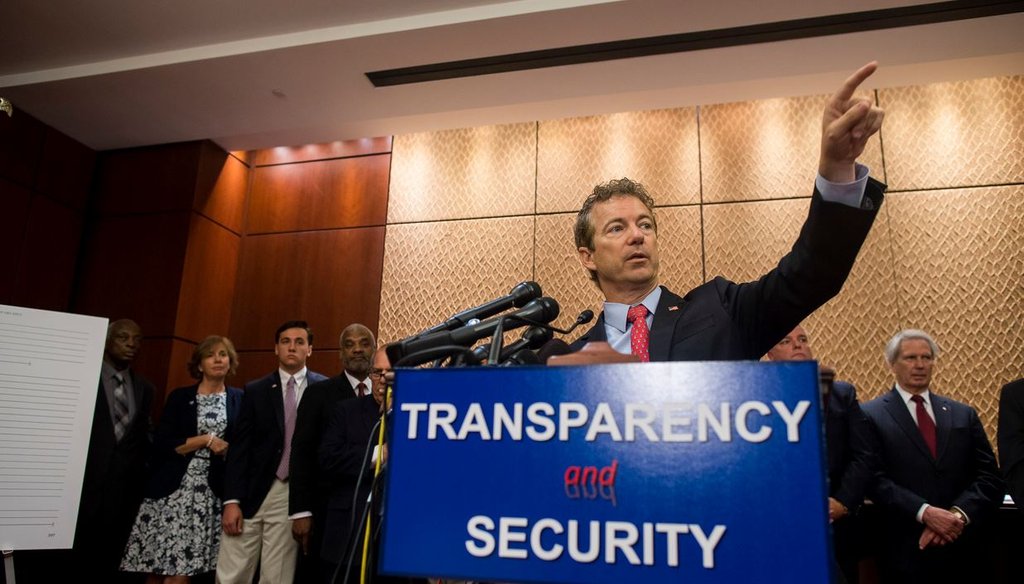Get PolitiFact in your inbox.

Sen. Rand Paul, R-Ky., during a news conference at the Capitol in Washington, June 2, 2015. (Zach Gibson/The New York Times)
Congress has been battling this week over how to handle the expiration of certain provisions of the Patriot Act. Senate Majority Leader Mitch McConnell has been fighting for an extension, while U.S. Sen. Rand Paul, R-Ky., has been fighting it every step of the way.
Largely because Paul ran out the clock, the government surveillance program that collects Americans’ phone records in bulk -- made public by Edward Snowden’s revelations -- temporarily expired May 31. Two days later, the Senate passed a House surveillance bill that restored the programs with a few new limitations.
Paul sees the original program as a violation of privacy and the Fourth Amendment, which bars warrantless search and seizure.
McConnell says the law protects national security. He took to the Senate floor on May 31 to denounce opponents as conducting "a campaign of demagoguery and disinformation."
McConnell emphasized that "the content of the calls are not captured. That’s the general view, but it’s an incorrect one. That’s what I mean about a campaign of disinformation. The only things in question are the number dialed, the number from which the call was made, the length of the call and the date. That’s it."
McConnell is correct in that the program collects metadata -- such as the phone numbers dialed and call length -- not that the government is listening in on all the calls. His claim of "disinformation" inspired us to go looking for cases where other senators mischaracterized the program.
We looked through as many of Paul’s recent statements as we could find -- there’s a lot -- and found he doesn’t claim the government collects the content of the calls. But he sees the collection of metadata itself as a huge problem.
In a recent Time essay, Paul described the program as "bulk collection of phone records" and said it was "invasive", "illegal" and "ineffectual" at catching terrorists.
On the Senate floor May 31, Paul addressed those who say the program isn’t overly invasive because it doesn’t capture content. He said that regardless, it’s unconstitutional.
"People say, well, they’re not looking at it, they’re not listening to it -- it’s the tip of the iceberg, what we’re talking about here," he said.
Is the collection of phone metadata a big deal? We consulted several experts who all said that even without knowing the content of someone’s conversations, analysts can glean plenty of personal information from the metadata.
Multiple experts pointed to a 2014 quote from Michael Hayden, former head of both the NSA and the CIA: "We kill people based on metadata." Another intelligence official, NSA General Counsel Stewart Baker said, "Metadata absolutely tells you everything about somebody’s life. If you have enough metadata, you don’t really need content."
"It is now beyond any serious dispute that a tremendous amount of personal, private information can be gleaned from who calls whom and when," said Elizabeth Goitein, co-director of the Brennan Center for Justice’s Liberty and National Security Program at New York University.
Goitein gave an example: If phone records show a person calling and hanging up on a suicide hotline three times in one evening, someone can make a conclusion about the person making the phone call even without hearing the content of the call.
"The content of these calls reveals nothing; indeed, there is no content," she said. "The metadata, on the other hand, is extraordinarily revealing."
The law’s proponents are right that there are some limits on what the government can look at. The government can’t just browse the data generally; it can only examine information on phone numbers with terrorist ties, said Molly Bishop Shadel, a law professor at the University of Virginia and an expert in national security.
"The odds are that it will never look at your metadata at all -- only if you have been in contact with a phone number connected to terrorism," she said.
This year, a federal appeals court decided that the program is illegal. However, the court did not address the question of whether or not the program is constitutional or within bounds of the Fourth Amendment.
Rather, it found that Section 215 of the Patriot Act -- under which the program operated -- does not permit bulk phone record collection. Section 215 allows for record collection "relevant" to national security cases, but in collecting every record, they were, according to the court, going beyond the scope of "relevant."
The Supreme Court ruled in 1979 that while phone conversations (the content) are private, Americans can’t expect the same level of privacy regarding their phone records, Shadel said. The court found that collecting phone records wasn’t a search under the Fourth Amendment, so warrants would not be required to collect them. This is the basis of the government’s position that the program is constitutional.
She noted though, that if this issue were to make it in front of the Supreme Court, she’s not sure today’s justices would reaffirm the 1979 ruling.
Our Sources
Sen. Rand Paul Senate speech, May 31, 2015
Sen. Rand Paul, Senate speech, May 20, 2015
Time, "Sen. Rand Paul: I Will Stop the Illegal NSA Spying," May 30, 2015
Sen. Rand Paul on the Laura Ingraham radio show, June 1, 2015
New York Times, "N.S.A. Collection of Bulk Call Data Is Ruled Illegal," May 7, 2015
New York Times, "Surveillance Bill Awaits Verdicts on Amendments From Hawks in Senate," June 1, 2015
New York Times, "Key Parts of Patriot Act Expire Temporarily as Senate Moves Toward Limits on Spying," May 31, 2015
New York Review of Books, "‘We Kill People Based on Metadata,’" May 10, 2014
Washington Post, "Inspector General finds Justice Dept. slow to create privacy rules," May 21, 2015
PolitiFact, "Mark Udall says ordinary Americans' business records caught up in surveillance net," June 13, 2013
U.S. District Court, Testimony of Edward Felton, Princeton University professor, Aug. 23, 2013
Web Policy, "MetaPhone: The Sensitivity of Telephone Metadata," March 12, 2014
Email interview, Elizabeth Goitein, law professor at New York University, June 2, 2015
Email interview, Molly Bishop Shadel, law professor at University of Virginia, June 2, 2015
Email interview, Jonathan Meyer, cybersecurity fellow at Stanford University, June 2, 2015
Email interview, Laura Donohue, law professor at Georgetown University, June 2, 2015
















































